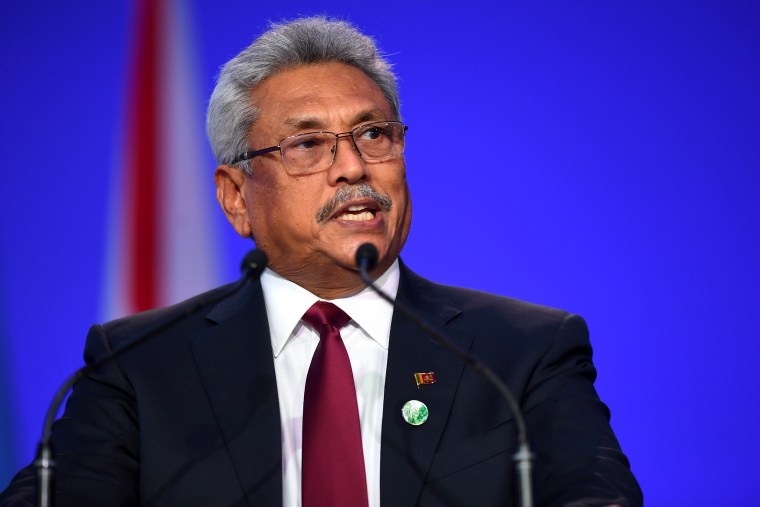COLOMBO, Sri Lanka — Sri Lankan President Gotabaya Rajapaksa fled the country on Wednesday, hours before he was due to step down after a people’s uprising over a devastating economic crisis ended his family’s grip on the island nation.
Later in the day, Prime Minister Ranil Wickremesinghe declared a state of emergency and a curfew with immediate effect as several hundred people demanding his resignation surrounded his office in Colombo. Police officers fired several rounds of tear gas and a military helicopter briefly circled overhead, but the protesters appeared undeterred.
“The prime minister as acting president has declared a state of emergency (countrywide) and imposed a curfew in Western Province,” Wickremesinghe’s media secretary, Dinouk Colombage, told Reuters. Western Province includes Colombo.
The speaker of parliament said Rajapaksa had approved Wickremesinghe acting as president, invoking a section of the constitution dealing with times when the president is unable to fulfill his duties.
The president’s flight brings an end to the rule of the powerful Rajapksa clan that has dominated politics in the South Asian nation for the last two decades.
Protests against the economic crisis have simmered for months and came to a head last weekend when hundreds of thousands of people took over key government buildings in Colombo, blaming the Rajapaksas and their allies for runaway inflation, corruption and a severe lack of fuel and medicines.
Government sources and aides said the president’s brothers, former Prime Minister Mahinda Rajapaksa and former finance minister Basil Rajapaksa, were still in Sri Lanka.
Gotabaya Rajapaksa, his wife and two bodyguards left the main international airport near Colombo aboard a Sri Lankan Air Force plane early on Wednesday, the air force said in a statement.
A government source and a person close to Rajapaksa said he was in Male, the capital of the Maldives.
Rajapaksa was due to step down as president on Wednesday to make way for a unity government.
Wickremesinghe has also offered to resign as prime minister. If he does, Mahinda Yapa Abeywardena, the speaker of Sri Lanka’s Parliament, will be the acting president until a new president is elected on July 20 as scheduled.
Protest leaders, however, say the prime minister is allied to the Rajapaksas and have warned of a “decisive fight” if he does not resign.
“We are strongly against the Gota-Ranil government. Both have to go,” said Buddhi Prabodha Karunaratne, one of the organizers of recent protests.
Amid the economic and political chaos, Sri Lanka’s sovereign bond prices hit fresh record lows on Wednesday.
The U.S. Embassy in Colombo, which is in the central district of the city, said it was canceling consular services for the afternoon and for Thursday as a precautionary measure.
The island nation’s tourism-dependent economy was hammered first by the coronavirus pandemic and then suffered from a fall in remittances from overseas Sri Lankans. A ban on chemical fertilizers damaged farm output, although the ban was later reversed.
The Rajapaksas implemented populist tax cuts in 2019 that affected government finances, while shrinking foreign reserves curtailed imports of fuel, food and medicines.
Gas has been severely rationed and long lines have formed in front of shops selling cooking gas. Headline inflation hit 54.6 percent last month, and the central bank has warned that it could rise to 70 percent in coming months.
Mahinda Rajapaksa, the president’s elder brother, resigned as prime minister in May after demonstrations against the family turned violent. He remained in hiding at a military base in the east of the country for some days before returning to Colombo.
